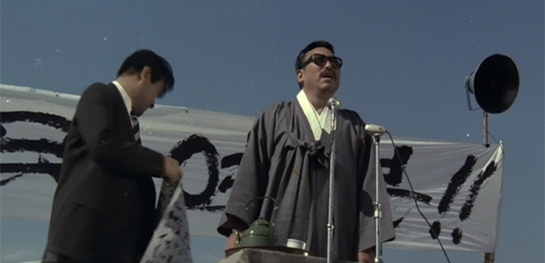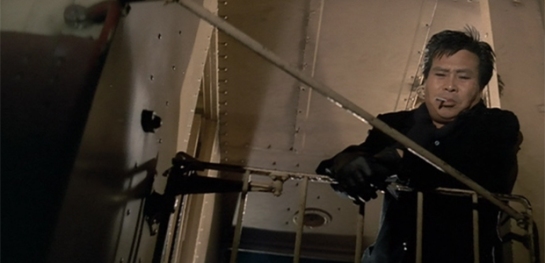 Assassin
Assassin
Year: 1969
Director: Lee Man Hee
Writer: Lee Eun Seong (based on the novel by Lee Oyoung)
Starring: Jang Dong Hui, Nam Gung Weon, Park Am, Kim Hyeo Kyoung, Oh Ji Myoung, Jeon Young Seon, Choi Bong,
Lee Man Hee only lived to the age of 43, but in that time he managed to direct at least 50 films, although only half survive today. Assassin is an oddity of a film as it shows Lee at his most experimental. The film, despite having a very basic plot, has a very complex rhythm which can be argued doesn’t actually work. Although challenging, it is an uneven piece and at times a real effort to struggle through.

The Communist Party have discovered one of their biggest supporters is about to switch allegiances. As he intends to announce the switch the next day, it is decided he must be assassinated that night. That way everyone will assume anti-communists are responsible. An assassin (Jang) is chosen and as he takes on the case, accompanied by Number 1 (Nam), his ‘daughter’, who is actually the daughter of a man he killed in the past, is babysat by Number 2 (Oh). The entire length of the film is basically the assassin on his way to kill his target. The lack of names is an indication of the disconnect the audience will probably feel, as there is no entry point into this world of politics and assassins. We’re constantly left on the outside, making it hard to care for the outcome. As the film also fails to wrap up a number of plot points, it also seems like a waste of time.
The middle section is a constant build up of tension, or at least it would be if it wasn’t so repetitively constant. It soon becomes apparent that the long walk to the target is going to make up the majority of the film. However, Lee tries to instill a quick pace with jarring cuts between three separate stories. We see the assassin on his way, the target settling down for the night with his lover, and the daughter being babysat. The cuts are so quick that it seems as though they are heading towards something, but after about 20 minutes you realise that the pay-off is nowhere in sight. The music is also repeated to a sickening degree. Some of the edits between the different locations are nice, but you’ll soon be bored by daughter’s story that goes nowhere and doesn’t seem to end.

There’s a lot of metaphorical dialogue and meaningful imagery to take in, and decoding it can be fun at times, but there’s also just too much meaningless meandering as well. Lee really is a great filmmaker, but this is a project that needs to be watched in context and as a companion to his surviving works. Films in South Korea were heavily censored at the time due to the rule of Park Chung Hee, but many others managed create serviceable and well plotted films during this time. If you’re looking into the history of Korean cinema and want to check out Lee Man Hee’s work, don’t start with this effort.

Will I enjoy it?
The title and plot may seem like something a little more action orientated, but don’t be fooled. It’s a slow burner that requires a lot of thinking and analysing, which itself is disrupted by a nauseatingly edited second act which continuously bounces around. This is one for completists and those that simply must explore the more bizarre areas of film. If you want to understand why it’s sometimes best to stick to the rules of editing, this may explain why.





